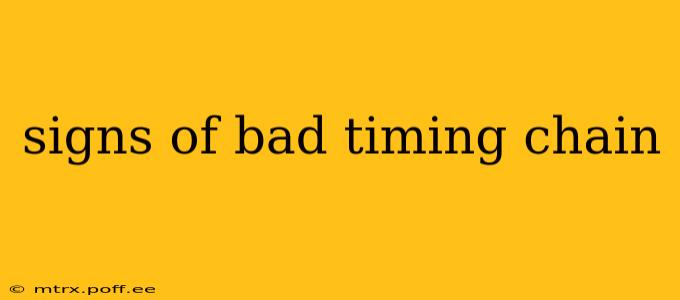A timing chain is a crucial component of your car's engine, silently orchestrating the precise interplay between pistons and valves. When this vital part starts to fail, the consequences can be catastrophic, ranging from decreased performance to complete engine failure. Recognizing the signs of a failing timing chain early can save you significant repair costs and potential headaches. This comprehensive guide will explore the common indicators that your timing chain needs attention, helping you avoid costly surprises.
What is a Timing Chain?
Before diving into the warning signs, let's briefly understand the function of a timing chain. Unlike a timing belt (which is made of rubber and requires periodic replacement), a timing chain is a metal chain that synchronizes the rotation of the crankshaft and camshaft. This precise synchronization ensures that the engine's valves open and close at the correct moments relative to the piston movement. A properly functioning timing chain is essential for optimal engine performance and longevity.
Common Signs Your Timing Chain is Failing
Several symptoms can signal trouble with your timing chain. While some are subtle, others are more pronounced and demand immediate attention. Let's explore the most common signs:
1. Engine Noise: A Metallic Rattle or Clatter
This is often the first and most noticeable sign. A failing timing chain will produce a distinct metallic rattling or clattering sound, particularly noticeable at idle or during startup. This noise is caused by the chain becoming worn, stretched, or loose, leading to it slapping against the timing chain cover or other engine components. The sound might worsen as the engine warms up or under load.
2. Rough Engine Idling or Running
A worn or damaged timing chain can disrupt the precise timing of the engine's valves. This can result in rough idling, misfires, or a general lack of smoothness in engine operation. The engine might hesitate or stumble, especially at low speeds.
3. Check Engine Light Illuminates
The check engine light is a crucial warning indicator. While it can illuminate for a variety of reasons, a problem with the timing chain can trigger it. A diagnostic scan by a mechanic will pinpoint the specific issue causing the light to illuminate.
4. Decreased Engine Performance
A malfunctioning timing chain can lead to a noticeable drop in engine performance. You might experience reduced power, slower acceleration, and decreased fuel efficiency. The engine might struggle to reach higher RPMs.
5. Engine Misfires
If the timing chain's synchronization is off, it can cause the engine to misfire. This can manifest as a rough running engine, loss of power, and potentially even backfires.
6. Difficulty Starting
In severe cases, a severely worn timing chain can make it difficult to start the engine. The mistiming can prevent the engine from firing properly, resulting in a prolonged cranking time or failure to start altogether.
What Happens if You Ignore a Bad Timing Chain?
Ignoring the signs of a failing timing chain can lead to severe consequences. The most serious outcome is catastrophic engine failure. This can involve bent valves, piston damage, or even a cracked engine block, leading to extremely costly repairs or even the need for a complete engine replacement.
How Much Does a Timing Chain Replacement Cost?
The cost of a timing chain replacement varies significantly depending on the make, model, and year of your vehicle, as well as the labor rates in your area. It's generally a more involved and expensive repair than replacing a timing belt. It's best to consult with a qualified mechanic to get an accurate estimate for your specific vehicle.
Can a Timing Chain Be Repaired or Only Replaced?
While some minor issues might be addressed through adjustments, a significantly worn or stretched timing chain generally requires complete replacement. It's not a component that can be easily repaired.
How Often Should a Timing Chain Be Replaced?
Unlike timing belts that have a recommended replacement interval, timing chains are generally designed for the lifespan of the engine. However, they can still wear out prematurely due to various factors such as age, wear and tear, and lack of proper maintenance. Regular maintenance and monitoring for the warning signs mentioned above are crucial.
This guide provides a comprehensive overview of the signs indicating a failing timing chain. Remember, early detection and prompt action can prevent catastrophic engine damage and save you significant repair costs. If you notice any of the symptoms described above, consult a qualified mechanic for diagnosis and repair as soon as possible.
